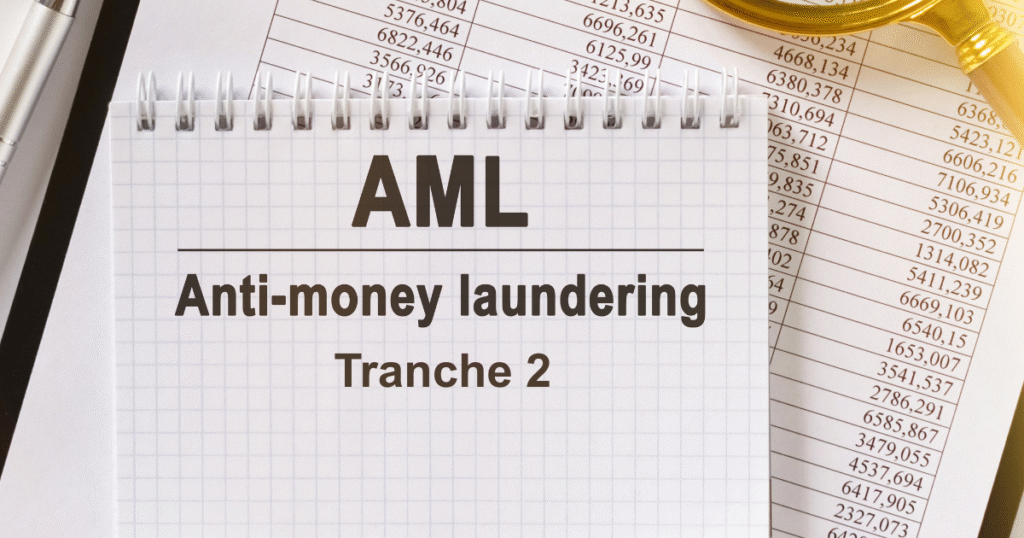Introduction
Australia’s anti-money laundering and counter-terrorism financing (AML/CTF) regime is being reformed with the introduction of Tranche 2. This reform, initiated by the Anti-Money Laundering and Counter-Terrorism Financing Amendment Act 2024 Cth (Amendment Act), expands the scope of AML/CTF regulations to include additional sectors. Tranche 2 aims to bring more businesses under the AML/CTF regime.
These Tranche 2 reforms will affect real estate agents, lawyers, and accountants, as well as other designated service providers. These newly regulated Tranche 2 entities will need to comply with their obligations to combat financial crime, money laundering, and terrorism financing. This guide provides foundational steps for these businesses to prepare for Tranche 2 AML/CTF compliance.

Understanding AML /CTF Tranche 2 Reforms
Expanding the Scope of AML/CTF Regulations with Tranche 2
Tranche 2 of the AML/ CTF regime is set to broaden the sectors that are subject to AML/CTF obligations. This expansion aims to address existing loopholes that may be exploited for money laundering and terrorism financing. The reforms will bring new sectors into the AML/CTF regime, including real estate agents, lawyers, and accountants. This is a significant reform that will impact a wider range of businesses.
Key Features of Tranche 2 Reform
Tranche 2 reforms introduce several key features that businesses in newly regulated sectors must understand and comply with. These features are designed to enhance Australia’s fight against financial crime. The core components of Tranche 2 reform include:
- Enhanced Due Diligence Requirements: Businesses will need to undertake customer due diligence (CDD) to understand the nature of their customers’ business activities. This involves verifying customer identities and monitoring transactions for suspicious activity.
- New Reporting Obligations: Newly regulated businesses will face reporting obligations similar to those already in place for current reporting entities. These obligations include submitting suspicious matter reports (SMRs), threshold transaction reports (TTRs), and annual compliance reports to the Australian Transaction Reports and Analysis Centre (AUSTRAC).
- AML/CTF Compliance Programs: Entities will be required to establish AML/CTF compliance programs tailored to their specific risk exposure. These programs should include policies and procedures to identify, mitigate, and manage the risks of money laundering and terrorism financing.
Get Your Free Initial Consultation
Request a Free Consultation with one of our experienced AML Lawyers today.
Foundational Steps for Tranche 2 AML/CTF Compliance
Conduct a Comprehensive AML/CTF Risk Assessment
Legal firms must conduct a comprehensive risk assessment to comply with AML/CTF obligations. This involves identifying and understanding the specific risks of money laundering and terrorism financing that the firm may face. It is also important to document these assessments thoroughly and review them regularly to remain current with changes in the risk environment.
Key steps in conducting a risk assessment include:
- Identify specific risks: Pinpoint the unique money laundering and terrorism financing risks relevant to your firm.
- Document findings: Ensure all risk assessment findings and processes are meticulously recorded.
- Regularly review: Update and review the risk assessment periodically to reflect changes in the risk landscape.
Develop and Implement a Tailored AML/CTF Program
Developing and implementing a tailored AML/CTF program is essential for firms to meet their obligations. This program should be specifically designed to suit the firm’s size, nature, and complexity. A comprehensive program should include two key parts:
- Part A: General Risk Management: This section should address the overall strategies for managing AML/CTF risks.
- Part B: Customer Identification and Verification: This part must detail the procedures for verifying and identifying customers to prevent money laundering and terrorism financing.
Strengthen Customer Due Diligence Practices
Robust CDD practices are crucial for complying with AML/CTF regulations. This includes implementing effective Know Your Customer (KYC) processes for verifying and identifying customers. Firms should also undertake ongoing monitoring of customer transactions to detect any suspicious activities. Enhanced due diligence (EDD) is necessary for customers identified as high-risk, requiring more thorough scrutiny.
Key aspects of strengthening CDD practices are:
- Implement KYC procedures: Establish thorough processes for customer identification and verification.
- Ongoing monitoring: Continuously monitor customer transactions to detect and report suspicious activities.
- Apply Enhanced Due Diligence: Use extra scrutiny and verification for high-risk customers to mitigate potential risks.
Understand and Fulfil Reporting Obligations to AUSTRAC
Legal firms have critical reporting obligations to meet under AML/CTF regulations. These obligations are essential for helping to detect and prevent financial crimes. Firms must report certain types of transactions and activities to AUSTRAC, Australia’s financial intelligence agency.
Reporting obligations include:
- Suspicious Matter Reports: Report any suspicious matters to AUSTRAC. Reports related to terrorism financing must be submitted within 24 hours, and other suspicious activity within three business days.
- Threshold Transaction Reports: Lodge TTRs for transactions involving physical currency of AUD 10,000 or more (or foreign equivalent). These must be submitted within 10 business days of the transaction.
- International Funds Transfer Instructions (IFTIs): Submit IFTI reports for cross-border transactions involving instructions to transfer funds into or out of Australia. These reports are due within 10 business days of the transfer instruction.
Establish Effective Record Keeping Practices
Maintaining accurate and comprehensive records is a vital part of AML/CTF regulatory compliance. Legal firms are required to keep records of customer identification, transaction records, and risk assessments for a mandated period, typically seven years. This practice supports compliance, aids in risk management, and assists in investigations if necessary.
Effective record keeping involves maintaining records of:
- Customer Identification: Keep detailed records of all customer identification procedures, including copies of ID documents and verification processes.
- Transaction Records: Document all transactions related to designated services provided to clients, including details, amounts, dates, and relevant correspondence.
- Risk Assessments: Regularly update and securely store records of risk assessments, including methodologies and findings.
Tips for effective record keeping include:
- Utilise reliable software: Implement AML/CTF compliance software with secure storage, easy retrieval, and audit capabilities.
- Conduct regular audits: Perform periodic audits of records to ensure they are complete, accurate, and current.
- Ensure secure storage: Store records securely, whether in hard copy or electronic format, to prevent unauthorised access and maintain data integrity.
- Provide staff training: Train staff on record-keeping requirements and the use of compliance software to ensure consistency and accuracy.
Appoint a Dedicated AML/CTF Compliance Officer
Appointing a dedicated Compliance Officer is crucial for ensuring a firm adheres to AML/CTF regulations and manages associated risks. This individual should be at a management level and have a strong grasp of AML/CTF laws and regulations. They should also possess strong analytical skills, attention to detail, and effective communication abilities.
Key responsibilities of a Compliance Officer include:
- Overseeing the AML/CTF Program: Develop, implement, and maintain the firm’s AML/CTF program, ensuring it is tailored to the firm’s specifics.
- Conducting Risk Assessments: Regularly assess the firm’s money laundering and terrorism financing risk exposure and update assessments as needed.
- Ensuring Compliance: Monitor and ensure the firm’s adherence to all relevant AML/CTF regulations, staying updated on legislative changes.
- Providing Training and Awareness: Offer ongoing staff training on AML/CTF obligations and best practices, ensuring awareness of responsibilities and suspicious activity identification.
- Managing Reporting: Prepare and submit necessary reports like SMRs, TTRs, and IFTIs to relevant authorities.
- Liaising with Authorities: Serve as the main contact between the firm and regulatory bodies like AUSTRAC, ensuring timely and accurate communication.
Get Your Free Initial Consultation
Request a Free Consultation with one of our experienced AML Lawyers today.
Implement Regular AML/CTF Training and Awareness Programs
Regular training and awareness programs are essential to ensure all relevant staff understand their AML/CTF obligations. Effective training helps employees identify and report suspicious activities, strengthening the firm’s overall compliance framework.
Key components of an effective training program include:
- Comprehensive Curriculum:
- AML/CTF Regulations: Educate staff on current AML/CTF laws, regulations, and specific obligations under the AML/CTF Act.
- Risk Awareness: Highlight potential money laundering and terrorism financing risks and their consequences.
- Identification and Reporting: Train staff to identify suspicious activities and transactions and the correct reporting procedures.
- Regular Updates:
- Ongoing Training: Conduct regular sessions to update staff on new regulations, emerging risks, and policy changes.
- Refresher Courses: Provide periodic refresher courses to reinforce key concepts and maintain continuous awareness.
- Practical Scenarios:
- Case Studies: Use real-world examples to illustrate money laundering and terrorism financing techniques.
- Interactive Sessions: Incorporate quizzes, role-playing, and group discussions to engage staff and enhance learning.
- Tailored Training:
- Role-Specific Training: Customise programs based on staff roles and responsibilities.
- E-Learning Modules: Use e-learning for flexible, self-paced training, including modules offered by AUSTRAC.
- Documentation and Record-Keeping:
- Training Records: Keep detailed records of training sessions, attendance, topics, and assessments to demonstrate compliance.
- Feedback Mechanism: Implement a system for staff feedback on training to identify areas for improvement.
Implications and Consequences of Tranche 2 for Businesses
Tranche 2 of the AML/CTF regulations carries far-reaching implications for businesses operating within Australia. These changes are designed to enhance the regulatory framework, better prevent financial crime, and ensure a harmonised approach against money laundering and terrorism financing. However, these reforms also introduce new challenges, particularly for businesses with limited resources.
Enhancing Australia’s Fight Against Financial Crime
- Strengthened Regulatory Environment:
The expansion under Tranche 2 is expected to bolster Australia’s ability to combat financial crime.- By incorporating a broader range of sectors under AML/CTF regulations, existing loopholes that criminals could exploit are minimised.
- Alignment with international standards, such as those set by the Financial Action Task Force (FATF), enhances overall systemic integrity.
- Safeguarding the Financial System:
These reforms play a crucial role in protecting the nation’s financial system, ensuring that illicit funds do not enter or distort the legitimate economy.
Challenges and Burdens for Smaller Businesses
- Resource and Expertise Constraints:
Smaller businesses often face significant hurdles when meeting expanded regulatory requirements.- Limited staff and budgetary constraints can impede the development and implementation of robust compliance frameworks.
- Conducting thorough risk assessments and maintaining continuous staff training can be particularly challenging for these entities.
- Strategic Resource Allocation:
For smaller businesses, successfully navigating Tranche 2 will require proactive and strategic allocation of resources to ensure effective compliance without compromising operational efficiency.
Consequences of Non-Compliance with Tranche 2
Failure to adhere to the new AML/CTF obligations can have severe repercussions, as enforced by AUSTRAC:
- Financial Penalties:
- Non-compliance can result in fines that potentially reach millions of dollars, especially in cases of serious breaches.
- Reputational Damage:
- Public disclosure of compliance failures can significantly erode customer trust and damage business credibility.
- Loss of reputation may lead to a decline in market share and future business opportunities.
- Operational Disruptions:
- Enforcement actions might include orders to cease specific business activities, causing disruptions in normal operations.
- These operational challenges can affect profitability and long-term sustainability.
By understanding the broader benefits of Tranche 2—such as enhanced mechanisms to combat financial crime—and preparing for its associated challenges, businesses can strategically plan to meet these regulatory obligations. The significance of compliance cannot be overstated, as failure to adapt can result in financial, reputational, and operational setbacks.
Conclusion
The introduction of Tranche 2 marks a significant expansion of Australia’s AML/CTF regime. This reform extends AML/CTF obligations to a broader range of businesses, including real estate agents, lawyers, and accountants, requiring them to implement robust compliance frameworks. Proactive preparation is essential for these newly regulated entities to effectively meet their obligations and mitigate the risks of financial crime and terrorism financing.
Our team possesses specialised knowledge in anti-money laundering and counter-terrorism financing and can provide tailored guidance and support to help your business confidently meet its Tranche 2 obligations. To ensure your business is fully prepared and compliant with these reforms, contact AML House today.
Frequently Asked Questions
AML/CTF Tranche 2 expands Australia’s anti-money laundering and counter-terrorism financing laws to more sectors like real estate, legal, and accounting. It aims to strengthen the existing AML/CTF Act by making it easier for businesses to understand and follow the rules. The reforms were introduced by the Amendment Act.
Real estate agents, lawyers, accountants, and other designated service providers are newly regulated under Tranche 2. Trust and company service providers, along with dealers in precious metals and stones, are also included. These sectors are now under increased scrutiny to combat money laundering and terrorism financing.
Businesses under Tranche 2 must perform enhanced CDD, adhere to new reporting obligations, and create AML/CTF compliance programs. Customer due diligence helps understand customers’ activities and monitor for suspicious behaviour. Businesses also have reporting obligations similar to existing entities, like submitting SMRs and TTRs.
CDD is the process of investigating customers to understand their business and monitor suspicious activity. It’s crucial for complying with anti-money laundering and counter-terrorism financing rules. CDD involves KYC procedures, ongoing transaction monitoring, and EDD for high-risk customers.
Legal firms must submit SMRs, TTRs, and IFTIs to AUSTRAC. SMRs are required for any suspicious activity, with terrorism financing reports due within 24 hours. TTRs are for physical currency transactions of A$10,000 or more, and IFTIs are for cross-border fund transfers, both within 10 business days.
Businesses must keep AML/CTF records, including customer IDs, transactions, and risk assessments, for seven years. This supports compliance, risk management, and potential investigations. Record keeping is a vital part of AML/CTF compliance.
A Compliance Officer in a legal firm should be a manager with strong AML/CTF knowledge. They need analytical skills, attention to detail, and good communication to oversee the AML/CTF program. The Compliance Officer handles risk assessments, compliance, training, reporting, and liaison with AUSTRAC.
Non-compliance with Tranche 2 can lead to large fines, reputational damage, and business disruptions. Fines can be substantial, potentially millions of dollars. Reputational damage and operational disruptions can also occur.
Businesses can seek help from experts in anti-money laundering and counter-terrorism financing. Legal experts, like our team of attorneys at AML House, can guide businesses on their obligations and help them implement effective AML/CTF programs. This assistance ensures preparedness for the Tranche 2 reforms starting July 1, 2026








